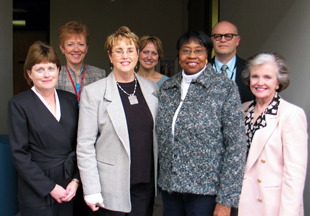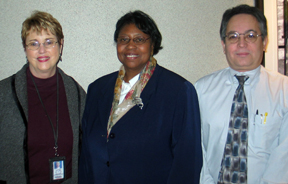 |
The research team includes from left: Patricia Hageman, Ph.D., Maureen Oberdorfer, Carol Pullen, Ed.D., Alicia Reinking, Emma Staples, Matthew Rutledge, and Susan Noble Walker, Ed.D. Not shown: Linda Boeckner, Ph.D. |
The six-month, $133,000 pilot study is funded by a grant from the UNMC Minority Health Education and Research Office. Researchers will evaluate whether an Internet-based program, called “A Web-Based Approach to Weight Loss for Rural Midlife African American Women,” will help women living in Brunswick County, Va., which is in south central Virginia near the North Carolina border.
Researchers will recruit 51 African American women, age 50 to 69, who are overweight or obese (body mass index 28 to 39.9).
The research was initiated through the Virginia-Nebraska Alliance, of which Saint Paul’s College is a partner. In 2004, UNMC and five Historically Black Colleges and Universities, and Virginia Commonwealth University, created a program to provide a multitude of academic and research opportunities for minority undergraduate students and faculty. Recently, two more colleges joined the alliance.
The ultimate goal of the alliance is to increase the number of minority health professionals and researchers nationwide, with hopes of promoting better health outcomes for underrepresented minorities.
The research study will promote gradual weight loss through a healthy eating plan based on reduced caloric and fat intake and gradually increasing physical activity, said principal investigator of the study, Carol Pullen, Ed.D., professor and assistant dean for distance education and technology in the UNMC College of Nursing.
Dr. Pullen and colleagues conducted a previous study in mostly rural Caucasian Nebraska women. That study was funded in 2001 by the National Institutes of Health and was led by Susan Noble Walker, Ed.D.
“Weight loss is complex. Much more is needed than just information about weight loss,” Dr. Pullen said. “The literature says that with monitoring weekly activity and weight loss, that people are more successful. We think doing this by Internet is an innovative way.”
“The good thing about this study is we have done weight loss studies in rural, mostly Caucasian women, and have found it successful. We also think it will help rural African American women,” Dr. Pullen said. “It’s important to find innovative ways to address the problem of being overweight and obesity, which are major, national health problems.
According to the U.S. National Institutes of Health, obesity is one of the most daunting health challenges of the 21st Century. About two-thirds of adults are overweight or obese. The problem is greater among African American women of which 71 percent are overweight or obese, compared with 52 percent of Caucasian women, according to a 2000 figure from the U.S. Department of Health and Human Services.
“Being overweight or obese causes heart disease, diabetes, stroke, disability and other problems. It’s very costly in terms of quality of life and health care and productivity costs,” Dr. Pullen said.
Emma Staples, interim chairman of the Department of Education at Saint Paul’s College in Lawrenceville, Va., will be co-investigator of the study. She’s thrilled with the partnership.
 |
The six-month, $133,000 pilot study is funded by a seed grant from the UNMC Minority Health Education and Research Office. From left are: Carol Pullen, Ed.D., Emma Staples, and Jose Romero, M.D., interim director of the UNMC Minority Health Education and Research Office and professor of pediatric infectious disease. |
Research staff at Saint Paul’s will include a research nurse, peer leader to conduct discussion groups and a technologist.
Study participants will be evaluated in three different groups to compare the effectiveness of an interactive web site, the interactive web site and a peer-led online support group, and the interactive web site plus professional counseling support via e-mail.
Researchers will evaluate weight loss, improvement of healthy eating and physical activity, at the beginning of the study and at three and six months. Web page content will be culturally relevant, and will include healthy eating and activity plans, charts for study participants to log daily food intake and activity, and weekly weight and goals. Also included will be suggestions for cooking lighter and lower fat and calorie recipes.
Researchers say positive changes in diet and exercise can significantly change midlife and older rural womens’ risk for disability and premature death.
“Rural older women are particularly vulnerable to disability associated with chronic illness as compared with their urban counterparts. They are poorer in health, have a greater incidence of chronic disease and suffer more limitations in daily activities,” Dr. Pullen said.
“Women’s health risks increase at menopause, but chronic diseases and their associated disability do not have to be an inevitable consequence of aging, said Dr. Noble Walker, co-principal investigator of the study and UNMC professor and Dorothy Hodges Olson Chair in Nursing, UNMC College of Nursing.
Women also will receive a variety of information about ways to prevent overeating, such as managing stress.
“We know stress plays a big role in African American womens’ lives,” Staples said.
In addition to improving health, the partnership will also develop researchers at Saint Paul’s College, and build its research capacity, Dr. Pullen said.
Researchers say once study participants establish themselves on the Internet, though they’ve never met face-to-face, they feel like they know each other. “We think they will form new relationships that will continue,” Staples said.
Dr. Pullen said midway through the study, she and other team members will attend a celebration meeting with study participants and the research team at Saint Paul’s.
Other co-investigators of the study include Patricia Hageman, Ph.D., director and professor, UNMC physical therapy education; Linda Boeckner, Ph.D., extension nutrition specialist and professor, Panhandle Research and Extension Center/Nutrition and Health Sciences; University of Nebraska-Lincoln, Project Coordinator Maureen Oberdorfer; and Matthew Rutledge, information technologist. Alicia Reinking is a graduate assistant working on the project.